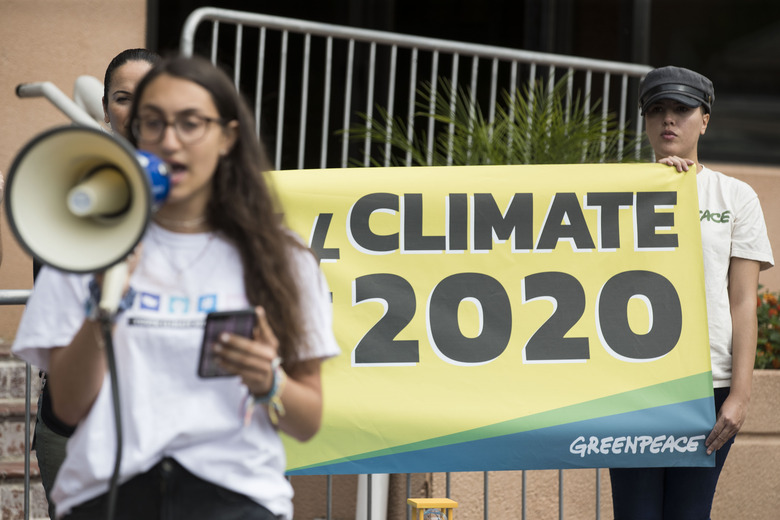Everything You Need To Know About The Climate Town Hall
The climate crisis is one of the most urgent issues of our time, but you never would have known it during the 2016 presidential race. The topic was almost entirely ignored during the debates between Clinton and Trump.
This time around, as the race for the Democratic nominee takes off, many of the candidates are hoping to change that. And CNN seems to want to change that, too – so much so that they devoted a full seven hours to a climate-focused town hall last week. Didn't have almost a full school day to devote to the festivities? Don't worry. Here's a breakdown of the highlights, the reaction and the climate points you'll want to keep an eye on as the campaign storms ahead.
Big Takeaways
Big Takeaways
Thumbs Up for a Carbon Tax: Environmental experts have long argued that the only way to get corporations to cut emissions is to hit them where it hurts. By slapping a tax on their emissions, they may finally cut back to avoid having to pay. But politicians have long shied away from the idea, mostly out of concern that it would mean higher energy costs for consumers. Now, though, with climate change looming large and the clock ticking, many of the current Democratic nominees voiced support for a tax. Notably, frontrunners Elizabeth Warren, Kamala Harris and Joe Biden have vocally supported a tax, while Bernie Sanders did not include it in his comprehensive Green New Deal initiative.
Fracking Still Divisive: One issue that prompted the most debate between candidates was the issue of fracking and natural gas. Sanders, Harris and Warren have supported a full ban on fracking. Candidates like Julian Castro and Biden were more temperate with their support; they said they supported when states made the decision to ban the practice but wouldn't call for a federal ban. Amy Klobuchar supported fracking, noting that she believes natural gas is a better fuel than oil.
Back to Paris Agreement: Nearly every candidate voiced support for re-entering the Paris Agreement. The U.S. entered it with 195 countries under the Obama administration, with the goal of limiting the temperature increase to 1.5 degrees Celsius with greater collaboration and commitment to clean energy between nations. Trump backed the U.S. out of it. Most of the Democratic candidates want back in. But as Cory Booker angrily noted during the town hall, that should be a no-brainer for any Democratic candidate and not something any of them should be congratulating themselves for.
No Consensus on Nuclear: Like fracking, the issue of nuclear power was a point of divisiveness during the debate portion of the town hall. On one side of the issue was Sanders. He said he would propose not renewing nuclear power plant licenses if he became president, calling the technology too dangerous and irresponsible. On the other end were Booker and Andrew Yang, who said that we couldn't expect to reduce emissions without the help of nuclear. Warren, Harris and Klobuchar were more in the middle. None of them called for an outright ban but voiced support for states that made the decision to stay away from it, and said the country would have to prioritize making nuclear power as safe as possible.
The Right’s Reaction
The Right's Reaction
Republican reaction to the town hall was all over the place. Trump, predictably, took to Twitter to scoff at the candidates devoting time to discussing the climate.
But at least some Republicans were paying attention. While they didn't agree with all the proposals being discussed, some, like Texas's Dan Crenshaw, tweeted about bipartisan ideas to "clean up the environment." Sure, he resorted to some pandering by talking about banning cows (a policy no one has suggested), and sure, those bipartisan ideas likely aren't far-reaching enough to combat the threat of climate change, but the fact that Republicans were speaking up about the need to improve environmental policies is a solid indication that more people are realizing how important the topic is.
Things to Watch for Going Forward
Things to Watch for Going Forward
Sidestepping Republicans: While there were issues of contention during the town hall, all of the Democratic candidates agreed that addressing the climate crisis will mean taking bold, expensive action and implementing several new policy initiatives. Watch for more talk about how they're going to actually accomplish this if one of them makes it to the White House.
More Young People Speaking Out: When it comes to actual voting numbers, it's a lot of old people. But climate change is going to affect young people the most, and they know it. The debate featured questions from members of the youth-focused Sunrise Movement, and the town hall was trending on Twitter thanks in large part to younger students and activists chatting up the event. Keep an eye on these movers and shakers as the campaign heats up, and don't be afraid to lend your voice to the young people putting pressure on our leaders to combat the crisis.
Cite This Article
MLA
Dragani, Rachelle. "Everything You Need To Know About The Climate Town Hall" sciencing.com, https://www.sciencing.com/democratic-climate-change-debate-news-13721632/. 12 September 2019.
APA
Dragani, Rachelle. (2019, September 12). Everything You Need To Know About The Climate Town Hall. sciencing.com. Retrieved from https://www.sciencing.com/democratic-climate-change-debate-news-13721632/
Chicago
Dragani, Rachelle. Everything You Need To Know About The Climate Town Hall last modified March 24, 2022. https://www.sciencing.com/democratic-climate-change-debate-news-13721632/
